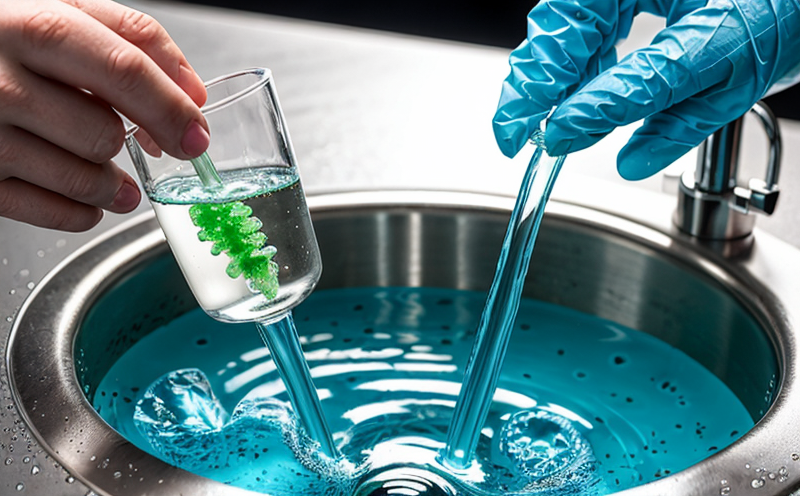ISO 7899-1 Enterococci Detection Test in Water
The ISO 7899-1 standard provides a comprehensive protocol for the detection of enterococci in water, which is crucial for ensuring public health and environmental safety. This method specifically targets Enterococcus faecalis and Enterococcus faecium, two bacteria known for their resistance to antibiotics and ability to survive harsh conditions. The test is widely used by water utilities, wastewater treatment plants, and environmental agencies to monitor the quality of drinking water and ensure compliance with regulatory standards.
The procedure involves several critical steps: sample collection, preliminary incubation, selective enrichment, and confirmation tests using biochemical methods or molecular techniques like PCR (Polymerase Chain Reaction). Each step requires precision to minimize false positives and negatives. The selectivity of the media used in this process is paramount as it ensures that only enterococci are identified from a complex microbial community.
The ISO 7899-1 method employs a series of selective enrichments on Tryptone Glucose Chloramphenicol Agar (TGC) and further confirmation through triple sugar iron agar (TSI). This approach allows for the differentiation between Enterococcus species based on their biochemical characteristics. The test's sensitivity is enhanced by using a quantitative method, which provides an estimation of enterococci in CFU/mL (colony-forming units per milliliter).
The importance of this test cannot be overstated, especially given the increasing prevalence of antibiotic-resistant bacteria. By employing ISO 7899-1, laboratories ensure that they are adhering to international best practices and providing accurate data that can inform public health policies.
| Step | Description |
|---|---|
| Sample Collection | Pipeline water samples or wastewater effluents should be collected in sterile containers to avoid contamination. |
| Preliminary Incubation | Samples are incubated at 35°C for 18-24 hours to allow the growth of viable enterococci. |
| Selective Enrichment | Enrichment is performed on TGC agar, which selectively promotes the growth of Enterococcus. |
| Confirmation Test | The confirmed colonies are further analyzed using biochemical tests or PCR to identify them as Enterococcus faecalis or Enterococcus faecium. |
The ISO 7899-1 method is particularly useful in scenarios where there are concerns about the presence of antibiotic-resistant strains. The test's robustness allows for accurate quantification and identification, which can guide interventions to control bacterial spread.
For water utilities and wastewater treatment plants, this test ensures compliance with regulatory standards such as those outlined by WHO (World Health Organization) and EPA (Environmental Protection Agency). By adhering to ISO 7899-1, these entities not only meet regulatory requirements but also contribute to the overall improvement of public health.
Industry Applications
- Water Utilities: Monitoring potable water and ensuring compliance with international standards like ISO 7899-1.
- Wastewater Treatment Plants: Detecting the presence of enterococci in treated effluents to prevent contamination of natural water bodies.
- Environmental Agencies: Conducting routine checks on surface waters and assessing the impact of industrial discharges.
- Hospitals and Healthcare Facilities: Ensuring that medical waste does not contain resistant enterococci that could be harmful to patients.
The ISO 7899-1 method is essential for these industries as it provides a reliable means of detecting the presence of enterococci, thereby ensuring water safety and public health. It supports decision-making processes in regulatory compliance, quality control, and environmental protection.
Eurolab Advantages
At Eurolab, we pride ourselves on offering a comprehensive suite of services that cater to the needs of our clients in water and wastewater testing. Our ISO 7899-1 Enterococci Detection Test is conducted by highly skilled professionals using state-of-the-art equipment and adhering strictly to international standards.
Expertise: Our team comprises experts with extensive experience in microbiology, environmental science, and water quality testing. They are well-equipped to handle complex samples and provide accurate results.
Technology: We utilize advanced laboratory equipment such as automated incubators, PCR machines, and high-resolution microscopes to ensure precise results. Our laboratories are equipped with the latest technology, ensuring that we can deliver timely and reliable reports.
Compliance: Eurolab is committed to compliance with international standards, including ISO 7899-1. We provide detailed reports that meet the requirements of regulatory bodies such as WHO, EPA, and local environmental agencies.
Quality Assurance: Our quality assurance protocols are robust and ensure that every test we perform meets the highest standards of accuracy and reliability. This commitment to excellence is reflected in our consistent performance and client satisfaction.
Use Cases and Application Examples
- Treatment Plant Monitoring: Regular testing ensures that the treatment process effectively eliminates enterococci before discharge into natural water bodies.
- Water Quality Audits: Periodic testing helps identify any breaches in water quality standards and informs corrective actions.
- Discharge Compliance Checks: Testing at wastewater plants verifies compliance with effluent discharge limits set by regulatory authorities.
- Medical Waste Management: Ensuring that medical waste does not contain resistant enterococci is crucial for preventing nosocomial infections in healthcare facilities.
| Use Case | Description |
|---|---|
| Treatment Plant Monitoring | Regular testing ensures that the treatment process effectively eliminates enterococci before discharge into natural water bodies. |
| Water Quality Audits | Periodic testing helps identify any breaches in water quality standards and informs corrective actions. |
| Discharge Compliance Checks | Testing at wastewater plants verifies compliance with effluent discharge limits set by regulatory authorities. |
| Medical Waste Management | Ensuring that medical waste does not contain resistant enterococci is crucial for preventing nosocomial infections in healthcare facilities. |
These examples highlight the importance of ISO 7899-1 testing in ensuring water safety and public health. By implementing this method, our clients can effectively manage their water quality and comply with regulatory requirements.





